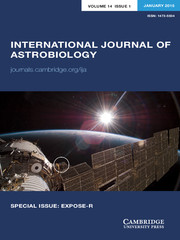Crossref Citations
This article has been cited by the following publications. This list is generated based on data provided by
Crossref.
Richards, Jeffrey T.
Corey, Kenneth A.
Paul, Anna-Lisa
Ferl, Robert J.
Wheeler, Raymond M.
and
Schuerger, Andrew C.
2006.
Exposure ofArabidopsis thalianato Hypobaric Environments: Implications for Low-Pressure Bioregenerative Life Support Systems for Human Exploration Missions and Terraforming on Mars.
Astrobiology,
Vol. 6,
Issue. 6,
p.
851.
Benson, Erica
Harding, Keith
and
Day, John G.
2007.
Algae and Cyanobacteria in Extreme Environments.
Vol. 11,
Issue. ,
p.
365.
Berry, Bonnie J.
Jenkins, David G.
and
Schuerger, Andrew C.
2010.
Effects of Simulated Mars Conditions on the Survival and Growth of
Escherichia coli
and
Serratia liquefaciens
.
Applied and Environmental Microbiology,
Vol. 76,
Issue. 8,
p.
2377.
Lehto, Harry J.
2012.
From the Earth's Core to Outer Space.
Vol. 137,
Issue. ,
p.
309.
Schuerger, Andrew C.
Ulrich, Richard
Berry, Bonnie J.
and
Nicholson, Wayne L.
2013.
Growth ofSerratia liquefaciensunder 7 mbar, 0°C, and CO2-Enriched Anoxic Atmospheres.
Astrobiology,
Vol. 13,
Issue. 2,
p.
115.
Waters, Samantha M.
Robles-Martínez, José A.
Nicholson, Wayne L.
and
Schottel, J. L.
2014.
Exposure of Bacillus subtilis to Low Pressure (5 Kilopascals) Induces Several Global Regulons, Including Those Involved in the SigB-Mediated General Stress Response.
Applied and Environmental Microbiology,
Vol. 80,
Issue. 16,
p.
4788.
Martin, Derek
and
Cockell, Charles S.
2015.
PELS (Planetary Environmental Liquid Simulator): A New Type of Simulation Facility to Study Extraterrestrial Aqueous Environments.
Astrobiology,
Vol. 15,
Issue. 2,
p.
111.
Verseux, Cyprien N.
Paulino-Lima, Ivan G.
Baqué, Mickael
Billi, Daniela
and
Rothschild, Lynn J.
2016.
Ambivalences of Creating Life.
Vol. 45,
Issue. ,
p.
73.
Verseux, Cyprien
Baqué, Mickael
Lehto, Kirsi
de Vera, Jean-Pierre P.
Rothschild, Lynn J.
and
Billi, Daniela
2016.
Sustainable life support on Mars – the potential roles of cyanobacteria.
International Journal of Astrobiology,
Vol. 15,
Issue. 1,
p.
65.
Murukesan, Gayathri
Leino, Hannu
Mäenpää, Pirkko
Ståhle, Kurt
Raksajit, Wuttinun
Lehto, Harry J.
Allahverdiyeva-Rinne, Yagut
and
Lehto, Kirsi
2016.
Pressurized Martian-Like Pure CO2 Atmosphere Supports Strong Growth of Cyanobacteria, and Causes Significant Changes in their Metabolism.
Origins of Life and Evolution of Biospheres,
Vol. 46,
Issue. 1,
p.
119.
Salleh, Siti Fatihah
Kamaruddin, Azlina
Uzir, Mohamad Hekarl
Mohamed, Abdul Rahman
and
Shamsuddin, Abdul Halim
2017.
Modeling the light attenuation phenomenon during photoautotrophic growth of A. variabilisATCC 29413 in a batch photobioreactor.
Journal of Chemical Technology & Biotechnology,
Vol. 92,
Issue. 2,
p.
358.
Schwendner, Petra
and
Schuerger, Andrew C.
2018.
Metabolic fingerprints of Serratia liquefaciens under simulated Martian conditions using Biolog GN2 microarrays.
Scientific Reports,
Vol. 8,
Issue. 1,
Schuerger, Andrew C.
Mickol, Rebecca L.
and
Schwendner, Petra
2020.
The Hypopiezotolerant Bacterium, Serratia liquefaciens, Failed to Grow in Mars Analog Soils under Simulated Martian Conditions at 7 hPa.
Life,
Vol. 10,
Issue. 6,
p.
77.
Hussain, M. Iftikhar
tsombou, François Mitterand
and
El-Keblawy, Ali
2020.
Surface Canopy Position Determines the Photosystem II Photochemistry in Invasive and Native Prosopis Congeners at Sharjah Desert, UAE.
Forests,
Vol. 11,
Issue. 7,
p.
740.
Verseux, Cyprien
2020.
Bacterial Growth at Low Pressure: A Short Review.
Frontiers in Astronomy and Space Sciences,
Vol. 7,
Issue. ,
Bolatkhan, Kenzhegul
Sadvakasova, Assem K.
Zayadan, Bolatkhan K.
Kakimova, Ardak B.
Sarsekeyeva, Fariza K.
Kossalbayev, Bekzhan D.
Bozieva, Ayshat M.
Alwasel, Saleh
and
Allakhverdiev, Suleyman I.
2020.
Prospects for the creation of a waste-free technology for wastewater treatment and utilization of carbon dioxide based on cyanobacteria for biodiesel production.
Journal of Biotechnology,
Vol. 324,
Issue. ,
p.
162.
Cycil, Leena M.
Hausrath, Elisabeth M.
Ming, Douglas W.
Adcock, Christopher T.
Raymond, James
Remias, Daniel
and
Ruemmele, Warren P.
2021.
Investigating the Growth of Algae Under Low Atmospheric Pressures for Potential Food and Oxygen Production on Mars.
Frontiers in Microbiology,
Vol. 12,
Issue. ,
Mapstone, Lydia J.
Leite, Mara N.
Purton, Saul
Crawford, Ian A.
and
Dartnell, Lewis
2022.
Cyanobacteria and microalgae in supporting human habitation on Mars.
Biotechnology Advances,
Vol. 59,
Issue. ,
p.
107946.
Verseux, Cyprien
Poulet, Lucie
and
de Vera, Jean-Pierre
2022.
Editorial: Bioregenerative life-support systems for crewed missions to the Moon and Mars.
Frontiers in Astronomy and Space Sciences,
Vol. 9,
Issue. ,
Barone, Giovanni D.
Cernava, Tomislav
Ullmann, Jörg
Liu, Jing
Lio, Elia
Germann, Anna T.
Nakielski, Andreas
Russo, David A.
Chavkin, Ted
Knufmann, Kirstin
Tripodi, Farida
Coccetti, Paola
Secundo, Francesco
Fu, Pengcheng
Pfleger, Brian
Axmann, Ilka M.
and
Lindblad, Peter
2023.
Recent developments in the production and utilization of photosynthetic microorganisms for food applications.
Heliyon,
Vol. 9,
Issue. 4,
p.
e14708.


